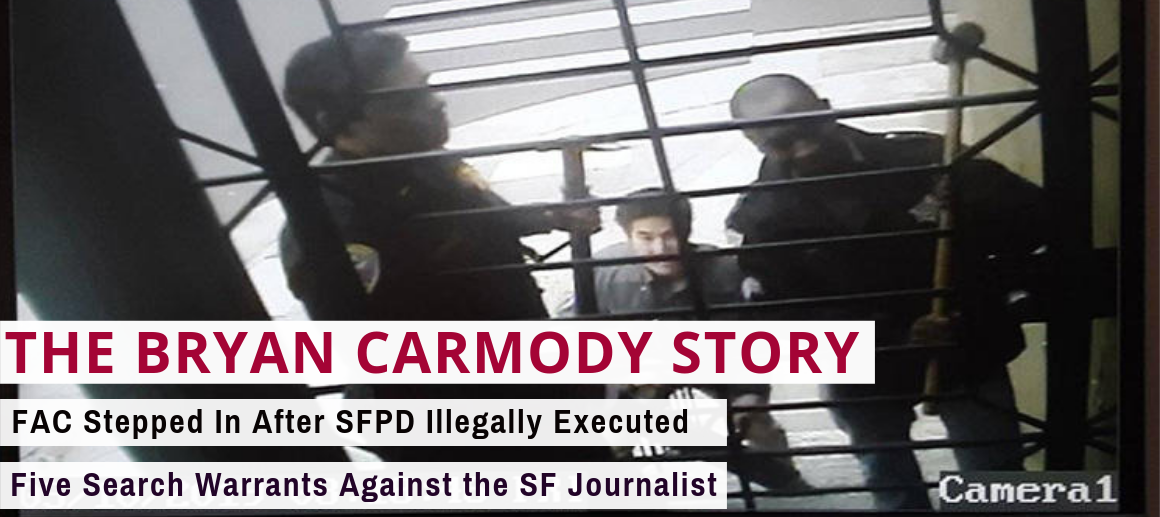The Bryan Carmody Story | In-Depth
News
special projects
THE BRYAN CARMODY STORY | IN-DEPTH

On May 10, 2019, San Francisco police showed up at the home of freelance journalist Bryan Carmody, equipped with a sledgehammer and pickax that they used to try to batter down his front gate. Guns drawn, officers placed Carmody in handcuffs for hours while they raided his home and office, seizing a trove of electronic devices and other materials.
The raid, part of an investigation into the leak of a police report on the death of San Francisco Public Defender Jeff Adachi, quickly sparked national outrage. Press-freedom advocates, politicians and others criticized the police department’s heavy-handed tactics — and its clear violation of California law, which prohibits the use of search warrants to seize a journalist’s notes and other materials.
FAC stepped in immediately, answering Carmody’s call for help on the day of the raid by securing qualified legal counsel to protect his rights. FAC then rallied a coalition of groups to file a motion to unseal the police department’s applications for search warrants, to seek more transparency in the ordeal.
California law could not be more clear: Authorities may not use a search warrant to seize material protected by the state’s journalist shield law. That law, among the nation’s strongest, generally prevents government officials from obtaining journalists’ unpublished materials, including confidential sources. And yet police obtained five warrants from five different judges to search Carmody’s property and phones. Then those records remained hidden from the public, concealing critical information about how a journalist who contributed to coverage of Adachi’s death — and then refused to give up his source — became the target of raid.
FAC’s motion to unseal the search warrant records should not have been necessary: Under California law, the affidavits should have quickly been made public. Instead, FAC and its coalition partners (Reporters Committee for Freedom of the Press and the Society of Professional Journalists, NorCal Chapter) were forced to wage a lengthy courtroom battle to bring light to the now-infamous ordeal.
Additionally, FAC filed two open-records lawsuits for information related to the police search and underlying events. See FAC v. SFPD, Mayor London Breed filed in San Francisco Superior Court under the California Public Records Act and Carmody v. FBI filed in the Northern District of California under the Freedom of Information Act. And we continue to advocate for journalists’ rights, including giving legal education about shield protections. See more about our Subpoena Defense Initiative.
THE CARMODY STORY | PRESS FREEDOM
News Archive
- FAC, Carmody File FOIA Suit Against FBI - July 17, 2020
- One Year After Raid on Journalist, FAC, SPJ NorCal Launch Efforts to Protect Press Freedom
- FAC Sues San Francisco Police, Mayor for Records - August 20, 2019
- Fifth Judge Sides with FAC, Unseals Warrant Records in Carmody Raid - September 3, 2019
- Statement by FAC’s David Snyder on Newly Unsealed Carmody Search Warrant Materials - August 6, 2019
- FAC Again Prevails in Unsealing Search Warrants Executed on SF Journalist Bryan Carmody - August 5, 2019
- Police Failed to Tell Judge of Bryan Carmody’s Status as Journalist Before Obtaining Warrant, Unsealed Records Show - July 23, 2019
- FAC Succeeds in Unsealing Search Warrant Executed on SF Journalist Bryan Carmody - July 19, 2019
- FAC Moves to Unseal Search Warrants in Illegal Police Raid on SF Journalist - May 16, 2019
THE CARMODY STORY | PRESS FREEDOM
Court Records: Warrants
View records related to the legal effort to unseal warrant applications
- FAC's motion to unseal search warrant records - May 16, 2019
- GRANTED: Unsealed phone warrant (Judge East)
- GRANTED: Unsealed phone warrant (Judge Quinn)
- GRANTED: Unsealed phone warrant and order to quash and unseal (Judge Hite)
- GRANTED: Unsealed home warrant (Judge Dekreon)
- GRANTED: Unsealed office warrant (Judge Hwang)
Find records from Bryan Carmody’s fight to void search warrants executed on his property and phones
- Motion to quash search warrants - May 16, 2019
- Amicus brief in support of motion to quash - May 16, 2019
- GRANTED: Order to quash and unseal phone warrant (Judge East)
- GRANTED: Order to quash and unseal phone warrant (Judge Quinn)
- GRANTED: Order to quash phone warrant (Judge Hite)
- GRANTED: Order to quash home warrant (Judge Dekreon)
- GRANTED: Order to quash office warrant (Judge Hwang)
